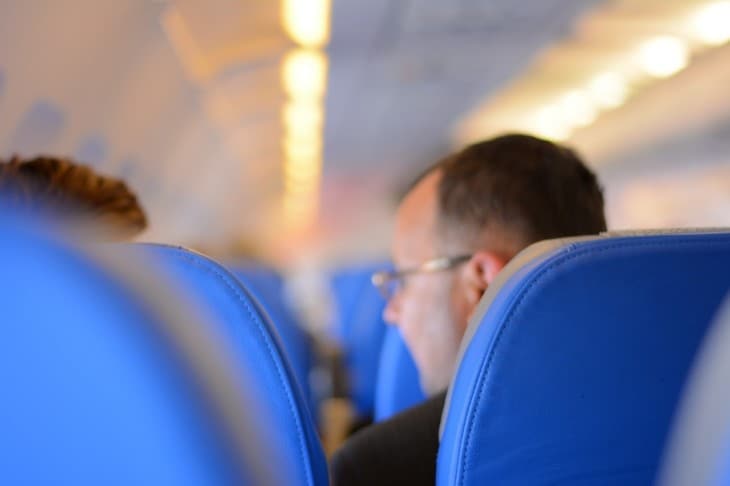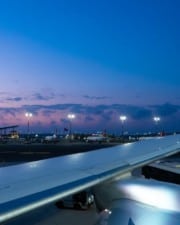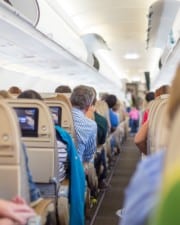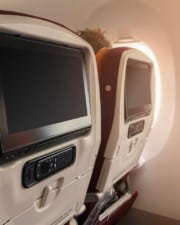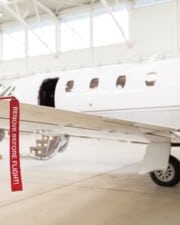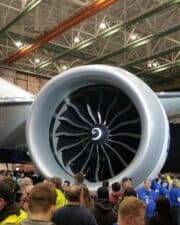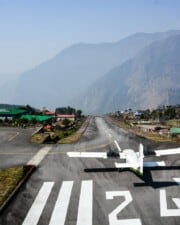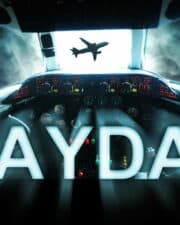Anyone who’s ever flown is likely all too familiar and annoyed with the sensation of their ears popping at 30,000 feet. Having your ears pop mid-flight is anything but pleasant. Why does this happen, and what can you do to prevent it from happening?
The short answer is that our ears pop due to changes in cabin pressure. As you might expect, conditions 30,000 feet in the air are different than they are at ground level. Even if you don’t feel the difference, your ears do, resulting in those all-too-annoying ear pops.
Naturally, you’d like to avoid that, so let’s take a more in-depth look and see what can be done to spare your ears.
Why Your Ears Pop
If you know anything about why ears pop onboard airplanes, chances are you have a vague idea of it somehow being related to pressure. This is correct, but the devil is in the details. Yes, the pressure onboard airplanes causes our ears to pop, but there’s a lot more to it than that.
For one thing, that pressure builds up in the first place because the air that far up in the sky is less dense than the air at ground level. Our ears are not used to such conditions. They are designed with air density and pressure conditions consistent with ground level.
Your inner ear already has air within it, and as the atmospheric pressure around you changes as you take off, the pressure on your ear drum begins to mount. As the plane continues to climb into the sky, this pressure increases and your eardrums are pushed outward.
On the one hand, that’s a lot less scary than it sounds. It is simply your ear drums expanding and adjusting to the new temperature. On the other hand, it is this expansion and interplay of air pressure between your eardrums and your surroundings which results in the pop.
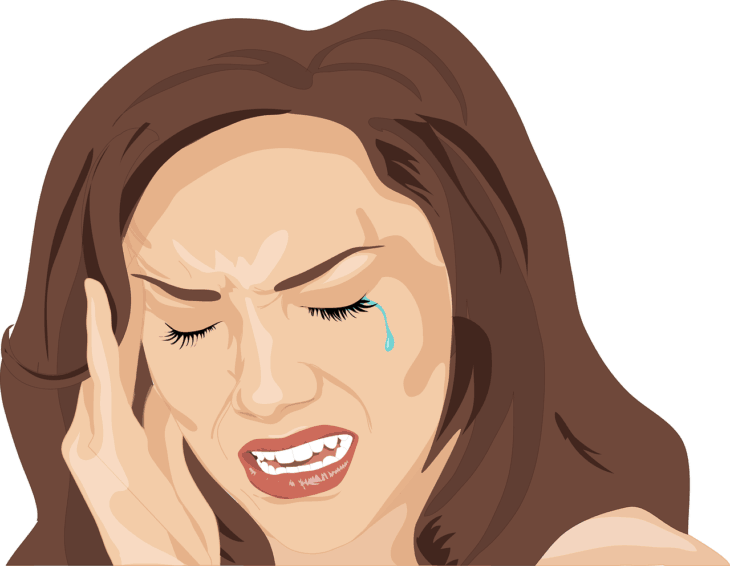
This is part of your body’s attempt to establish an equilibrium once more by allowing some of your inner ear’s air to pass through and out of the Eustachian tubes, which are two small channels connecting your inner ears to your throat.
With the increased pressure on them to push out that air and achieve equilibrium comes the characteristic “popping” sound.
Finally, if you are congested, your ear and nasal pathways may have even more pressure on them, making it even more likely that you experience ear popping as you fly.
Why Your Ears Might NOT Pop
On the other hand, while ear popping is a common enough occurrence, it is by no means a guarantee. Some people are lucky enough to not have to deal with it. While the rest might sit back in jealousy, it’s worth noting why you might not hear your ears pop.
There are two possibilities here. You may just be lucky that you are not having the same air pressure and equilibrium issues as those suffering from these problems. Every person and flight is different. Some people are more bothered than others, and some flights are more pop-inducing.
The second reason is one which should cool any jealousy that those with popping ears may have – namely, illness. If you are flying while congested, as mentioned above, you may experience ear popping in your own right.
On the other hand, it may also mean that you don’t experience any ear popping at all because your nasal and ear pathways are so congested as to stop air from escaping even with the added pressure.
However, this is far from anything to be envied. For one thing, our bodies try to maintain that equilibrium for a reason, so being unable to achieve it is never a good place to be health-wise.
The added pressure can cause headaches and other issues, to say nothing of the fact that to be so congested that your ears can’t pop probably means that you aren’t in for a very comfortable flight in the first place.
If anything, you might be the rare individual actually hoping in vain for your ears to pop just to relieve the pressure.
How to Pop Your Ears After a Flight
After all that, you may well be ready to pop your ears to relieve some of the pressure. With that in mind, let’s take a look at some ways of doing just that.
Both yawning and talking can activate your Eustachian tube, which can relieve the pressure on your ears by making them pop. Even a fake yawn may do the trick. Repeat this every few minutes until you finally hear them pop and the pressure is relieved.
Another relatively commonly known remedy for getting your ears to pop while onboard a plane is chewing gum. Once again, this is all about stretching and activating the muscles connected to your Eustachian tube.
Swallowing gum or sucking on candy is also an effective way of changing the pressure in your throat and activating the muscles necessary to relieve the pressure on your ears.
If your ears won’t pop due to nasal congestion, you might want to consider using a nasal decongestant. For best results, you’ll want to use a 12- to 24-hour decongestant and take it 30 minutes before takeoff as well as 30 minutes before landing.
If your ears are still fussy and won’t pop, you can try pinching your nose, sucking your cheeks in, and then blowing air back out while your nose is still pinched shut. You may look a bit silly, but this method, known as the Valsalva maneuver, can help relieve pressure.
Alternatively, you can try another nose-pinching maneuver called the Toynbee maneuver, which involves swallowing rather than sucking and blowing while your nose is still pinched.
If you have an early or late flight, you may be tempted to fall asleep the second your head hits the cushion once you board. However, doing so may allow pressure to build up in your ear canals while you sleep, resulting in painful popping once you wake up.
It may therefore be better to wait until the plane takes off before you drift off to sleep.
Use Ear Plugs
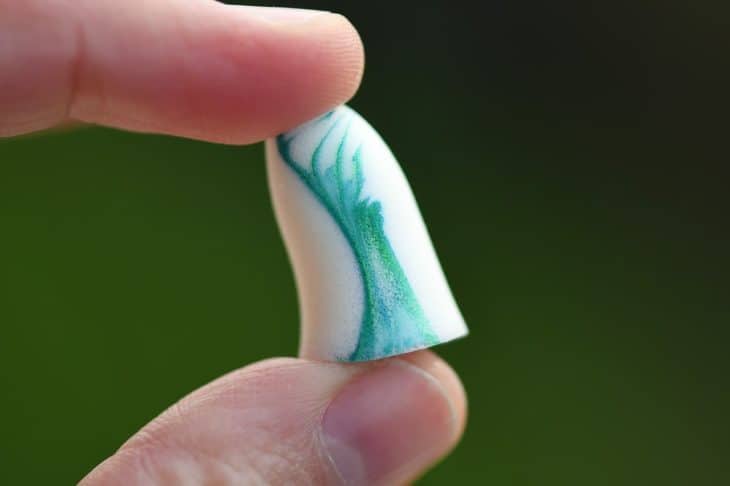
Of course, you’d just as soon skip all that ear popping and clogging and forego the discomfort that comes with it. Thankfully, ear plugs can help with this.
Ear plugs have become some of the most common pre-flight purchases. You purchase them well before your trip on Amazon or any number of outlets, as well as at stores in the terminal before your flight.
Read our article and roundup of the 14 Best Earplugs For Flying
It is generally best to have earplugs which create as tight of a seal as possible. For this reason, foam ear plugs which are easy to press fully into your ear and then let expand, thus blocking out sound, may be better than more solid, inflexible options.
Make sure that you are not too rough when pressing the earplugs into your ears. In addition, if you are looking to sleep while your ears are plugged, be sure to buy a softer pair – again, foam ear plugs can be a great choice here.
For as annoying as ears popping on a flight may be, the reasons why it occurs as well as the ways you can prevent it from happening and methods for causing it to occur intentionally are all easy to understand.
References ▾
Related Posts
